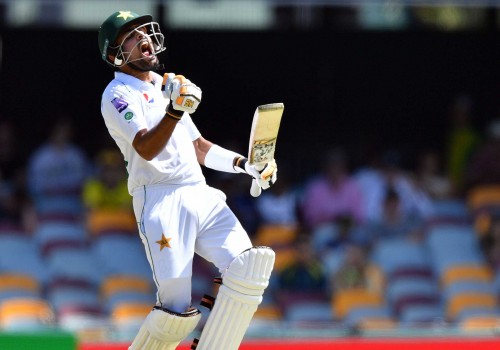Rubbed up the wrong way – Cricket Australia’s fall from grace and the need for change
As the sandpaper dust begins to settle on the Aussie ball-tampering scandal that so badly scuffed up international cricket’s polish, we give you the Expat Sport view on just what happened, why it’s important, and what the rest of the world thinks of both the crime and punishment.
March’s confrontational and fractious ICC test series, between Australia and South Africa, had already been marred by accusations of abusive and overly personal sledging. The culmination of which, lead to Australia’s then vice-captain, David Warner, having to be physically restrained during a dressing room altercation with Quinton de Kock. A vulgar reference to Warner’s wife allegedly being the spark that caused such ire.
It seemed that the ill-tempered nature of the first test would remain the low-light of an otherwise keenly contested series, until of course day three of the third test in Cape Town. In a crucial session post-lunch, cameras captured – and broadcast live within the ground – Cameron Bancroft attempting to abrade the surface of the match ball with a small yellow object. The crowd and Aussie Head Coach, Darren Lehmann, reacted with shocked expletives – Lehmann reputedly radioing down to his 12th man to ask Bancroft, “what the f$%k is happening?”.
Bancroft, realising he was caught red-handed clearly then panicked and comically attempted to hide the ‘small yellow object’ down his trousers, leading some to lend the scandal the somewhat light-hearted moniker of ‘budgie-smuggler-gate’.
Things rapidly escalated from that farcical point onwards and the true, and serious nature of what had occurred came out over subsequent days, bringing with it, shock, anger, sadness and the inevitable media furore.
After initially stating to the on-field umpires that the object he had been holding was a black microfibre sunglasses case to the on-field umpires then later, after video evidence made plain that this was not true, that it was yellow tape with sand and gravel from the pitch stuck to it. Five days after the initial press conference, Cricket Australia amended Bancroft’s statement once again, confirming that it was in fact sandpaper used to tamper with the ball.
But it was the organised nature of the tampering that caused the most outrage. An obviously mortified captain Steve Smith, admitting that the ‘leadership group’ of himself and David Warner had colluded with the more junior Bancroft, and had full knowledge of what was occurring on-field. The ICC’s initial punishment of demerit points for Smith and Bancroft and match fee fines quickly appeared to be too lenient.
With Australian Prime Minister, Malcolm Turnbull expressing his “shocking disappointment” on behalf of the nation, players, pundits and the general public demanded a sterner response. And very rapidly they received one.
Cricket Australia came out swinging, stripping the captaincy and vice-captaincy away and banning Smith and Warner from all cricket for 12 months and Bancroft for 9 months. Smith and Warner have now also lost their lucrative IPL contracts as a result along with numerous sponsorship withdrawals, severely hurting their bank balances as well as their reputations.
The flow of apologies kept pace with the flow of press conference tears leading to the inevitable resignation – despite being cleared of any collusion with the players – of head coach Darren Lehmann.
The spirit, integrity and team structure of Australian cricket lay in a disgraceful dirty heap on the dressing room floor.
International newspaper headlines accentuated the mighty and resounding fall from grace: “Smith’s shame”, “Sack them all”, “Caught with their pants down”, “Clown under”, “Show some balls”, “Hypocrites”, “Captain cry baby” just a few from around the globe.
Not everyone thought the crime fit the punishment however. Both spin legend Shane Warne and South Africa captain, Faf du Plessis, described the bans as “too harsh”.
While other commentators were quick to point out the discrepancy between ICC punishments meted out to other offenders from different cricketing nations. Most notably that Pakistani Muhammad Amir, bowling a no-ball for the bookies at his Captain’s instruction, was handed out a very hefty 5-year ban for an offence that had no real impact on the outcome of the game in question.
And while many former players / turned pundits were quick to add their opinion to the weighty stack of global condemnation, some were a little more reticent. England Ashes hero, Andrew Flintoff cautioned some of his ex-colleagues and competitors to be very careful with their condemnation as they were “chucking stones in glass houses”. Pointing out that all cricketers in their drive to win, took their on-pitch behaviour right up to, and occasionally over the line when it came to the rules, ethics and spirit of the game.
So what exactly is the result of this highest of profile cricket scandals? The newly installed Australian captain Tim Paine has already promised to change the aggressive culture of sledging so closely associated with Australian teams of late. Speaking in a news conference after his appointment he said that:
“I think there’s always a time and a place to talk to your opposition, but I think what’s said and how it’s said will be very different going forward.”
The desire to win at any cost is what drove these players to cheat to achieve their desired outcome and perhaps that aspect of the game will take longest to rectify. In the midst of an intensely fought match, fair-play perspective can go out of the window and with it the rational and ethical mindset that cheating is not, and never can be the solution. Paine also talked about a more mindful approach to the game:
“Part of what we spoke about a lot is playing on skill, not emotion. I think in the last couple of years at times we’ve been a touch too emotional and got carried away on that side of the game.”
The impact this will have on the Australian team in a crucial year leading up to the ICC World Cup 2019 will be huge. Certainly losing their talismanic batsman, Steve Smith, the nuggety competitiveness of Warner, not to mention the new found flair of Bancroft is bound to affect their win ratio on the field. But perhaps that is secondary to the real job facing this traumatised team; rebuilding the trust and respect of their supporters and the wider cricket family.
Yet to confirm their new head coach, but widely tipped to be Justin Langer, Cricket Australia have a tough road ahead of them to restore their reputation as one of the shining lights of world Cricket. But with a new commitment to institutional change, will we witness a rising of the golden phoenix again from the ashes of their immolated hubris?
Expat Sport will be sure to keep you posted.




